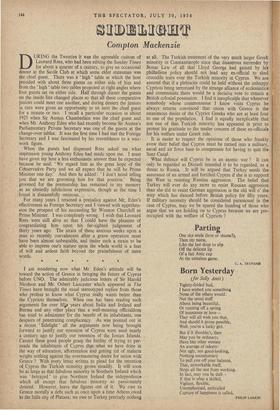Compton Mackenzie
DURING the Twenties it was the agreeable custom of Leonard Rees, who had been editing the Sunday Times for about a quarter of a century, to give an occasional dinner at the Savile Club at which some elder statesman was the chief guest. There was a ' high ' table at which the host presided with about three guests on either side of him and from the ' high ' table two tables projected at right angles where four guests sat on either side. Half through dinner the guests on the inside line changed places so that all these comparative juniors could meet one another, and during dessert the juniors in turn were given an opportunity to sit next the chief guest for a minute or two. I recall a particular occasion in about 1925 when Sir Austen Chamberlain was the chief guest and when Mr. Anthony Eden who had recently become Sir Austen's Parliamentary Private Secretary was one of the guests at the change-over tables. It was the first time I had met the Foreign Secretary and I was fascinated by his resemblance to a wax- work figure.
When the guests had dispersed Rees asked me what impression young Anthony Eden had made upon me. I must have given my host a less enthusiastic answer than he expected because he said, ' We regard him as the great hope of the Conservative Party and we all expect that he will be Prime Minister one day.' And then he added : '.I don't mind telling you that we are grooming him for that position.' Being groomed for the premiership has remained in my memory as an absurdly infelicitous expression, though at the time I found it distastefully ominous.
For many years I retained a prejudice against Mr. Eden's effectiveness as Foreign Secretary and I viewed with apprehen- sion the prospect of his succeeding Sir Winston Churchill as Prime Minister. I was completely wrong. I wish that Leonard Rees were still alive so that I could have the pleasure of congratulating him upon his far-sighted judgement of thirty years ago. The strain of these anxious weeks upon a man so recently convalescent after a grave operation must 'have been almost unbearable, and under such a strain to be able to impress one's stature upon the whole world is a feat of will and ardent faith beyond the praisefulness of mere words.
* * * * I am wondering now what Mr. Eden's attitude will be toward the action of Greece in bringing the future of Cyprus before UNO. The admirably judicious letters of Sir Harold Nicolson and Mr. Osbert Lancaster which appeared in The Times have brought the usual stereotyped replies from those who profess to know what Cyprus really wants better than the Cypriots themselves. When one has been reading such arguments for over fifp, years about India and Ireland and Burma and any other place that a well-meaning officialdom has tried to administer for the benefit of its inhabitants, one despairs of penetrating complacency. As was pointed out in a recent Sidelight' all the arguments now being brought forward to justify our retention of Cyprus were used nearly a century ago to justify our retention of the Ionian Islands. Cannot these good people grasp the futility of trying to per- suade the inhabitants of Cyprus that what we have done in the way of education, afforestation and getting rid of malaria weighs nothing against the overmastering desire for union with Greece ? With every letter written to plead for the retention of Cyprus the Turkish minority grows steadily. It will soon be as large as that fabulous minority in Southern Ireland which was betrayed' to give Northern Ireland the independence which all except that fabulous minority so passionately desired. However, leave the figures out of it. We owe to Greece morally a debt such as once upon a time Athens owed to the little city of Plataea; we owe to Turkey precisely nothing
* *
at all. The Turkish treatment of the very much larger Greek minority in Constantinople since that disastrous surrender by Bonar Law of all that Lloyd George had gained by his philhellene policy should not lead any ex-official to shed crocodile tears over the Turkish minority in Cyprus. We are assured that if a plebiscite could be held without the unhappy Cypriots being terrorised by the strange alliance of ecclesiastics and communists there would be a decisive vote to remain a British colonial possession. I find it inexplicable that whenever somebody whose commonsense I know visits Cyprus ha always returns convinced that union with Greece is the unanimous desire of the Cypriot Greeks who are at least four to one of the population. I find it equally inexplicable that not one of that Turkish minority has appeared in print to protest his gratitude to the tender concern of these ex-officials for his welfare under Greek rule.
It is easier to respect the opinions of those who frankly avow their belief that Cyprus must be turned into a military. naval and air force base to compensate for having to quit the Suez Canal.
What defence will Cyprus be in an atomic war ? It can only be regarded as Disraeli intended it to be regarded, as a threat to Russia. It will be argued that Turkey needs the assurance of an armed and fortified Cyprus if she is to support the West in resisting Russian aggression. The belief that Turkey will ever do any more to resist Russian aggression than she did to resist German aggression is the old will o' the wisp which has danced before British policy for fifty years. If military necessity should be considered paramount in the case of Cyprus, may we be spared the humbug of those who argue that we are holding on to Cyprus because we are pre- occupied with the welfare of Cypriots ?


































 Previous page
Previous page